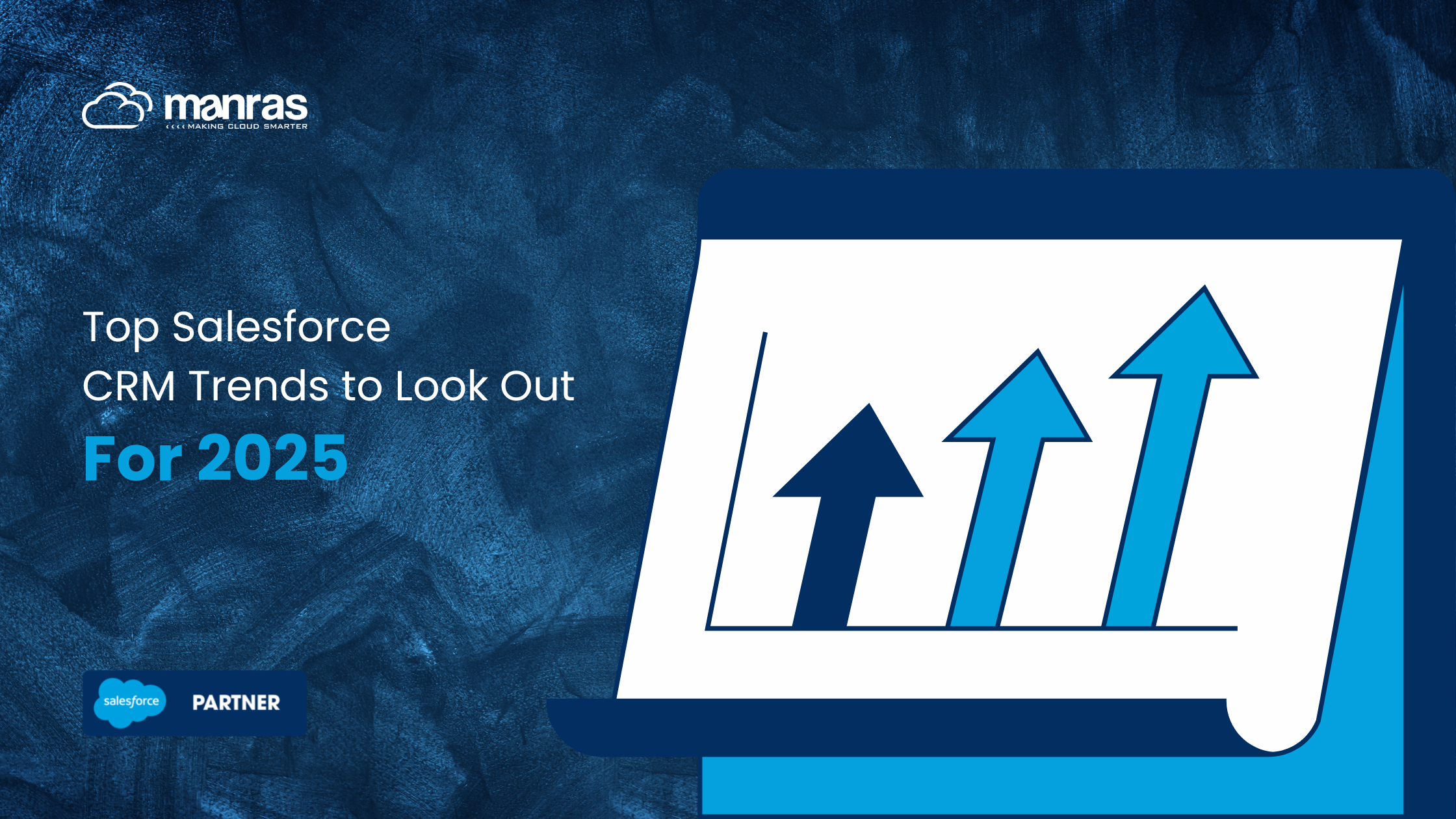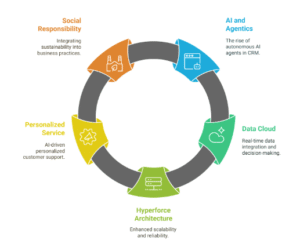
Top Salesforce CRM Trends to Look Out For in 2025
Are you ready for the Salesforce CRM Trends that will occur in 2025? Salesforce leads the market in advancing innovation and customer engagement strategies for businesses. To understand the Salesforce CRM trends of 2025, and their operational effects and market position shifts, companies must prepare and take guidance from Manras. Check out how they can help your company grow.
Let’s look at the core Salesforce CRM developments that business leaders should monitor for 2025 to understand their operational effects customer engagement outcomes and market position shifts. Salesforce stands ahead of change because its 150,000 worldwide customers depend on its powerful platform. Future CRM innovation will primarily result from five major trends that have emerged.
Waves of Agentics and AI
CRM is undergoing a radical change with the emergence of autonomous AI agents, led by Salesforce’s Agentforce. This AI wave will streamline operations and promote data-driven interaction across many industries, from government to SMBs, and will require careful planning and implementation, potentially with the help of experienced Salesforce partners like Manras.
Autonomous AI Agents and the Rise of Agentforce
Agentforce technology revolutionizes AI agents by setting them as the leading trend in the Salesforce ecosystem for 2025. These autonomous AI agents made their debut during Dreamforce ’24 before gaining further sophistication. The technology originated to handle regular tasks but will evolve into self-operating systems that coordinate with multiple agents to address complex companywide obstacles. This includes:
- Simulating New Initiatives: These agents use data simulations to model new product launches and marketing programs and supply companies with analytical results to improve their operational plans.
- Personalized Recommendations: Advanced AI capabilities enable these agents to recommend strategic process changes for sales and operations that help organizations become flexible and dedicated to their customers. This shift may also require businesses to seek expert guidance from Salesforce partners like Manras.
Enhancing Sales with xGen and xLAM Models
The AI models xGen Sales and xLAM Sales have been developed by Salesforce to meet the needs of enterprise-level users. These advanced models operate to maximize both personalization and predictive analytics capabilities. These models will undergo development which will enable organizations to expect:
- Stronger Customer Relationships: End-to-end behavioral customer insights enable businesses to personalize engagements that produce lasting loyalty.
- Operational Efficiency: These advanced operational models automate repetitive work to let employees dedicate time to vital strategic projects.
Sector-Specific Impacts
The AI wave generates impacts throughout numerous business sectors:
- SMBs (Small and Midsize-Sized Businesses): Small and Midsize-Sized Businesses can leverage AI agents to streamline operations and enhance AI-driven customer interactions and personalized marketing strategies, potentially with the guidance and expertise of Salesforce partners like Manras.
- Retail Sector: AI technology brings together product recommendation systems with fast customer support in retail which creates a better and faster shopping experience.
- Non-Profit Sector: The next generation of self-governing agents will boost the Autonomous Non-Profit Sector. Since 90% of its current operations utilize AI technology to enhance volunteer applications and staff assessment and mission achievement capabilities.
- Government Sector: The year 2025 will bring AI agents that will allow citizens to communicate directly for benefit information and program qualification standards and applications resulting in streamlined public service execution.
New times herald an upcoming phase where AI plays a fundamental role in operational execution to create data-driven engagement strategies.
Towards the Data Cloud
By using real-time data, the Data Cloud is revolutionizing CRM. For successful implementation, businesses can partner with experts like Manras Technologies. Retrieval Augmented Generation (RAG) further enhances this by unlocking insights from unstructured data.
Power of Real-Time Data Activation
Businesses today face excessive unstructured data at 80% and Salesforce Data Cloud has become a critical backbone for instant data integration and synchronization. In 2025, the Data Cloud will:
- Unify Disparate Data Sources: Platform integration of multiple customer touchpoint data sources, the system breaks down the data segregation which affects standard CRM systems.
- Facilitate Real-Time Decision Making: Businesses will improve their ability to make rapid decisions through real-time receipt of information from multiple customer channels.
Unstructured Data with RAG
The technology that shows immense promise is Retrieval Augmented Generation (RAG). The RAG system provides organizations with better capabilities to access and leverage internal data which leads to better results in generative AI applications. Businesses gain additional capabilities to work beyond structured data when they integrate this system.
- Extract Meaningful Insights: Advanced algorithms analyze free-form data and unstructured text alongside social media posts to extract meaningful insights.
- Drive Innovation: The system offers improved flexibility to generate AI responses that better capture complex customer dialogues.
Integrating with Customer 360
Through the combination of Salesforce Customer 360 and Data Cloud, organizations can achieve a complete view of how customers interact across every department. This integration will:
- Enhance Customer Profiles: Businesses gain complete insight into customer paths by uniting data between sales and service with marketing functions.
- Improve Engagement Strategies: The unified customer view enables businesses to deliver personal and timely interactions that fulfill customer requirements at every phase of relationships.
The Data Cloud emerges as the foundation for future CRM systems which will let businesses extract their data reservoir’s maximum benefit in 2025.
Hyperforce Architecture – Powering the Future of CRM
Salesforce’s Hyperforce, its code-driven infrastructure, is revolutionizing CRM by enabling rapid global scalability and enhanced reliability, a complex undertaking where the expertise of Salesforce partners like Manras can be crucial for optimal implementation.
An Advanced & Code-Driven Infrastructure
The Hyperforce architecture establishes an entirely new method through which Salesforce operates its infrastructure system. Hyperforce distinguishes itself from standard models because it relies completely on code-based infrastructure. The implementation of this approach provides multiple essential advantages to users.
- Global Scalability: Salesforce implements a code-based infrastructure to deploy its platform alongside applications to different regions with both speed and efficiency.
- Enhanced Reliability: All business clients across the globe can benefit from improved speed and reduced lag time through this system.
- Streamlined Updates and Management: Service disruptions become less frequent because code-generated systems provide enhanced reliability through their flexibility and fast response time.
Accelerated Innovation and Deployment
Using Hyperforce architecture will deliver multiple benefits to Salesforce customers.
- Rapid Deployment: Fast application deployment becomes possible through Hyperforce architecture because it removes physical hardware deployment barriers.
- Improved Security and Compliance: The deployment of code-driven current architecture leads organizations to simpler compliance with security standards along with regulatory requirements.
- Cost Efficiency: Companies that use codes instead of traditional hardware systems achieve better cost performance while achieving reliable system output.
Hyperforce serves as a strategic evolution that delivers an agile CRM platform that gives users global accessibility and enhanced responsiveness.
Personalized Customer Service & Predictive Analytics
The foundation of a successful CRM strategy is quickly evolving to include personalized customer care driven by AI and predictive analytics. Leading this change is Salesforce, which is improving its Service Cloud to provide more personalized and proactive support.
AI-Driven Insights for Superior Service
CRM strategies that succeed rely on delivering high-quality customer service to their foundation. Salesforce continues to transform its Service Cloud service to meet rising customer expectations by providing individualized and anticipatory support. In 2025, we can expect:
- Predictive Maintenance: AI will power Salesforce’s predictive maintenance platform which will help address service problems in advance to provide more comfortable service experiences.
- Autonomous Decision-Making: Field service organizations that implement autonomous AI systems will optimize their efficiency through autonomous decision-making capabilities that control schedules and resource allocation.
Transforming the Customer Journey
The company focuses on developing improved customer service solutions to build smooth enjoyable journeys for their customers. Organizations that integrate advanced data analytics and automation tools will improve their ability to:
- Resolve Issues Faster: The combination of AI tools fast-tracks issue detection and offers solutions that lead to accelerated issue resolution.
- Deliver Hyper-Personalized Experiences: The analysis of historical data in combination with real-time interactions empowers businesses to provide personalized experiences for each customer.
- Boost Field Productivity: Mobile applications with AI assistance will help field workers access vital data in real-time which lets them maintain superior performance across all work environments.
Social Responsibility – A New Priority in CRM
Social responsibility and sustainability are now key CRM priorities. To make sense of it all and use it best, Manras offers clear help. Find out how they can help you with your business.
Aligning Business Goals with Social Impact
Companies must integrate sustainability functions because doing so has become an essential business requirement. Organizations that excel at tracking ESG performance metrics along with reporting will gain a superior position as follows:
- Build Trust with Consumers: Effective sustainability communications create trust with customers because they receive accurate information about organization practices.
- Gain Competitive Advantage: Organizations that excel in sustainable practice development obtain substantial marketplace benefits when competing in evolving markets.
The trend towards corporate social responsibility has made sustainability a core focus for Salesforce in 2025, a shift that businesses, potentially with the support of partners like Manras, must adapt to.

Conclusion
Salesforce CRM Trends at an unprecedented pace in 2025 due to AI advances combined with cloud computing and sustainability trends. Such advancements enable total business transformation by redesigning how organizations relate to their end-users. The dedication to service improvement within the company makes each customer encounter more relevant and meaningful. Companies should think about working with seasoned Salesforce consultants like Manras to manage this transition and guarantee a smooth deployment. Organizations must focus on monitoring emerging trends and implementing new strategies to succeed in 2025.
For more insights, updates, and expert tips, follow us on LinkedIn.



